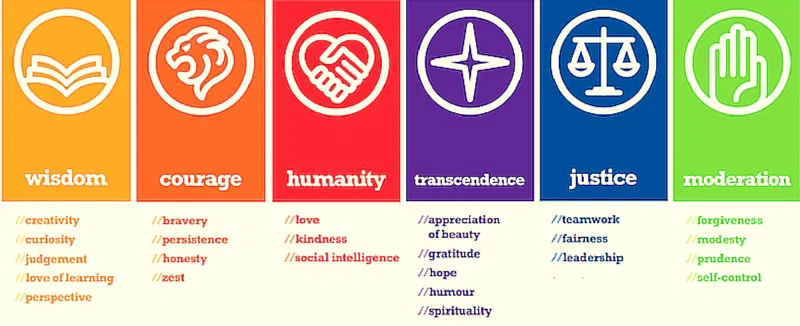
Psychologists have spent some decades now studying what makes for the good life. What’s fascinating is that the research into that question consistently shows that the path to a good life is the practice of the classical virtues. The six highlighted by Positive Psychology (the branch of psychology studying this) are wisdom, courage, humanity, justice, temperance (moderation), and transcendence. Each one of these categories consist of various components. This chart below breaks this down further:
An interesting study might involve seeing how it seems each generation tends to favor one or two of these categories at the expense of others. For example, right now there is an emphasis on the virtue of ‘justice’ and ‘love’—generally to the detriment of everything else, especially ‘moderation’ in the realm of sex. We’ve obviously inherited this from the 60s, but it has hit such a crescendo now that there is a growing pushback. What many people (especially young men) seem to be looking for amidst a “woke” culture that emphasizes justice without thought to anything else is the virtues found under the categories of “courage” and “wisdom”. That’s probably why someone like Jordan Peterson is so popular at the moment—he tends to hang out in that field and shows how moderation is an important component of it. Or consider Joe Rogan’s curiosity—people actually value that sort of thing. People also want ‘honesty’ in a time when we’ve all been told honesty is unloving.
Anyway, what is fascinating to me is how science is recognizing the importance of virtue and philosophy and spirituality. This is an interesting trend. When you couple this with the growing science of epigenetics, you get something even more interesting.
Epigenetics—the science of change
The growing field of epigenetics refers to how environments and habits and behaviors can change how your genes work. In other words, your genes can be altered—switched ‘on’ or ‘off’. The DNA that makes up our genes basically accumulates chemical ‘marks’ that determine how much or little of the genes are expressed. The collection of chemical marks is known as the epigenome, and it can change.
In 2010, TIME Magazine ran a story that highlighted how it works over generations. In the small and isolated county of Norbotten in Sweden, people would have seasons of feast and famine. In the 1980s, Dr. Lars Olov Bygren was interested in knowing how this affected the kids growing up in the 19th century, when there was a particularly bad period.
Around the time he started collecting the data, Bygren had become fascinated with research showing that conditions in the womb could affect your health not only when you were a fetus but well into adulthood. In 1986, for example, the Lancet published the first of two groundbreaking papers showing that if a pregnant woman ate poorly, her child would be at significantly higher than average risk for cardiovascular disease as an adult. Bygren wondered whether that effect could start even before pregnancy: Could parents’ experiences early in their lives somehow change the traits they passed to their offspring?1
And it turns out, it does. It was controversial then, but these days, plenty of studies and books are being released showing how stress, diet, exercise, relationships, environment, and toxins can switch genetics markers on and off.
In other words, your habits really do form you. Personality changes happen at the fundamental core of your DNA. Isn’t that interesting? We are indeed the sum of choices.
In a world where we’re increasingly told that “you are what you are” and that your feelings tell you who you are and should guide your actions, the science keeps going the opposite direction—that you are the sum of choices. Those choices include the choices of your parents, and your parents’ parents (and the choices you make will affect your kids.) In this sense ‘you are who you are’ in terms of who you were born. But the reality is that this is not the end of the story. Your story is what you make it. Life is not about being who you were born to be—life is actually becoming who you want to be by the time your time on this earth comes to its end.
A vision for humanity and the elephant
This gives us a very big picture on the importance of morals and ethics. Your choices truly change the trajectory not only of your own life, but generations to come. That means we can really change the trajectory of our societies and build toward a brighter future.
The elephant in the room with these discussions is that the science continues to point in the direction that we are the sum of choices. Including your own. In fact, you can even undo the choices of your parents and form a new path. You can end your days completely different to how you started. This goes against a culture that insists that the grand virtue of life is not growing into your potential and becoming a person of excellent character, but to live as one merely “born this way.”
In contrast to Lady Gaga’s message, it seems to me that you don’t have to be how you feel. Your feelings don’t have to guide you or rule you. Your identity is not how you feel.
Your identity isn’t predetermined.
Who you are is who you choose to be.
And the future is what you make it.
Why Your DNA Isn’t Your Destiny, by John Cloud. January 2010, TIME Magazine. https://time.com/archive/6690329/why-your-dna-isnt-your-destiny/



